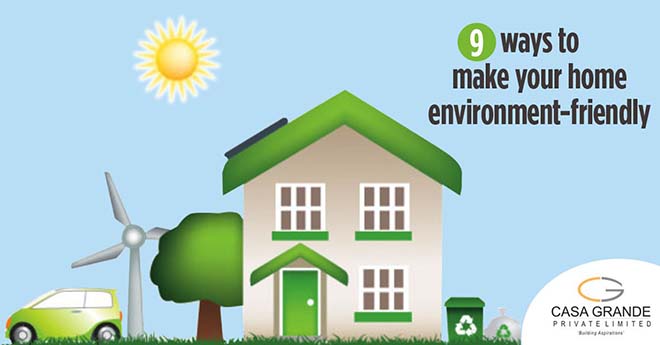With rising temperatures and global warming, it has become a norm to be more eco-friendly. Small steps taken by us in this direction can create a huge difference. Here are 9 ways to make your home environment-friendly:
1. Use CFL/LED bulbs and other energy efficient products
Replace all old bulbs and lights with energy efficient Light Emitting Diode (LED) or Compact Florescent Lamps (CFL). This will help you save energy and prevent the emission of greenhouse gases and harmful pollutants prove detrimental to the environment. Now-a-days, even other appliances such as television sets, refrigerators and air conditioners have energy efficient models that you can switch to conserve energy.
2. Explore hydroponics
Growing plants are not only decorative but also is good for the environment. If you have available space, you can also grow a terrace garden and plant herb garden. You can also explore hydroponics. It is a method of growing plants using mineral nutrient solutions, in water, without soil. Hydroponically grown foods not only taste better and are more nutritional. It doesn’t occupy too much space and is easy to get started and keeps pests away.
3. Buy furniture made from recycled materials
While buying furniture, consider ones that are made out of low emission materials such as bamboos, untreated cotton and hardwood frames. These types of furniture not only are better for the environment but also look extremely stylish.
4. Try solar panels at home for saving electricity
Installing solar panels can save you a lot of energy and money in the long run. You can also use solar heating to heat water. Surplus energy can be stored in a battery for later use. It’s the purest and cleanest energy source you will find.
5. Clean your house with vinegar regularly
We all go out and buy cleaning products to make sure our house is spick-and-span. However, everyone fails to realize that cleaning products such as soaps and scents are extremely toxic and contain harmful chemicals that can be hazardous to the environment as well as health. So instead of buying these harmful products, just go to your kitchen instead. Use vinegar to clean your house. It cuts grease, removes mildew, odors, some stains and wax build-up.
6. Make a compost bin
According to reports, an Indian citizen generates nearly 700 grams of solid waste per person per day which is nearly 250 kg in a year. Most of what we throw out as trash are actually organic and can be used. Composting is a natural way of making recycling decomposed organic material into rich soil for your plants. Mix food wastes with dirt and use a spade to turn the pile over every week and give it some air. Turn garbage and spoiled vegetables into something useful.
7. Say No to plastics
Plastic is harmful to the environment when it is manufactured and it is also not biodegradable. It is made from petroleum products and is not good for the environment. So when you go shopping, carry a cloth bag or jute bag in your handbag. This would prevent you from purchasing the plastic bags at the time of purchase.
8. Save water and look for ways to harvest rain water
Check your home for leaky faucets and fix them immediately. Install low-flow showerheads, which will help you cut down on water usage and save energy costs. Simple things like closing the water tap while shaving or brushing your teeth can save you a lot of water. Rain water harvesting should also be explored wherever possible. It can help you create a sustainable supply of water in your locality.
9. Choose Products with Low VOC Content
Volatile Organic Compounds are considered extremely harmful to health. The compound has a high vapor pressure at ordinary room temperature. VOC compounds are found in interior products such as paints and furniture, etc. Due to room temperature vaporization property, it can prove hazardous for your health. It is advisable to use products which contain minimal or less VOC.

















